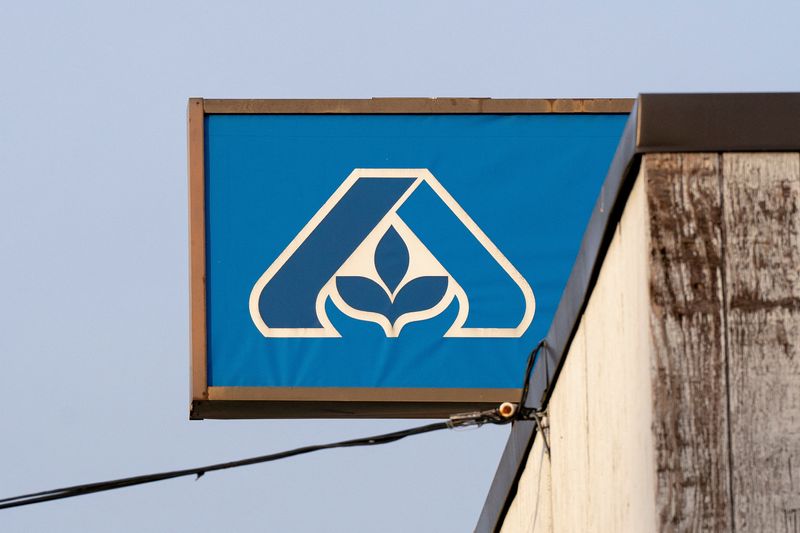By Jody Godoy and Aishwarya Venugopal
(Reuters) -Albertsons and Kroger (NYSE:KR) terminated their $25 billion merger plan on Wednesday after courts blocked the deal, with the former suing its rival and alleging a breach of contract that led to the deal's demise.
The formal termination ends a two-year effort by the chains to combine, which regulators argued would lead to higher prices for shoppers. Albertsons (NYSE:ACI) said it was suing due to Kroger's failure to take "any and all actions" to get the deal approved.
"Given the recent federal and state court decisions to block our proposed merger with Kroger, we have made the difficult decision to terminate the merger agreement," Albertsons CEO Vivek Sankaran said.
Albertsons is seeking billions of dollars in damages along with a $600 million termination fee.
Kroger called the claims baseless in a statement and said it will defend against them in court.
"This is clearly an attempt to deflect responsibility following Kroger’s written notification of Albertsons' multiple breaches of the agreement, and to seek payment of the merger’s break fee, to which they are not entitled," a Kroger spokesperson said.
Kroger said on Wednesday that after reviewing options, the supermarket chain has determined "it is no longer in its best interests to pursue the merger".
Albertsons operates around 2,300 stores and had alluded to the possibility of store closures and layoffs if the deal was blocked. However, the company sounded a positive note on Wednesday, touting recent investments in new technology.
Two different courts blocked the deal on Tuesday, siding with federal and state antitrust regulators, who moved to stop the deal by arguing that the merger would eliminate competition between the traditional grocery chains, causing higher prices and reducing leverage for unionized workers.
A combined Kroger and Albertsons would have had the second biggest share in the U.S. grocery industry with about 11%, based on 2023 industry market share information from GlobalData. Walmart (NYSE:WMT) would have continued to hold the top spot with about 17% of the market.
"Walmart, Costco (NASDAQ:COST) and other grocery giants are the clear winners in this scenario," said Blake Droesch, analyst with eMarketer. "The merger would have created a formidable grocery competitor to Walmart. But without the merger, Walmart remains in a league of its own."
The deal became a symbol of surging grocery costs and faced fierce regulatory opposition. U.S. food prices have risen by 25% over the last four years, and while food inflation is showing signs of cooling in 2024, grocery bills remain a concern for shoppers.
The U.S. Federal Trade Commission sued along with attorneys general from eight states and the District of Columbia. Washington state sued on its own to block the deal. In both of those cases, judges ruled on Tuesday that the deal would unlawfully decrease competition. Colorado had also sued to block the deal.
Kroger defended the proposed combination, saying it would bring prices down at Albertsons stores, where it said prices are 10-12% higher than its own. The merged company would fund price cuts through cost savings it expects from a larger operation, and a larger customer base to drive revenue for Kroger's data consulting business.
The rulings against the deal are the result of Kroger's unwillingness to listen to regulators' feedback and to sell off assets that would have allowed deal clearance, Albertsons said.
Had the deal proceeded, Kroger would own approximately 5,000 stores across the United States. The companies had argued at trial that selling 579 of the stores, particularly in western U.S. states where Kroger and Albertsons are located near each other, would preserve competition.
U.S. District Judge Adrienne Nelson, who oversaw the FTC case, disagreed, raising doubts that the proposed buyer of the stores, C&S Wholesale Grocers, could become a successful competitor.
Albertsons claims that Kroger rejected stronger candidates for the sale.
Several analysts had predicted a quick termination of the deal and said that Kroger would not appeal the decision to block the deal.
"We are disappointed by the Court's decision, but not surprised, given the narrow view of competition adopted by the FTC and pushback and lawsuits from multiple state attorneys general," Telsey Advisory Group analysts said after the deal was blocked.
Albertsons on Wednesday also said it would bump its quarterly dividend up to 15 cents a share from the current 12 cents a share, and it approved $2 billion in share buybacks, though that includes previously authorized share repurchases.
Separately, Kroger also said its board had approved a new share repurchase program authorizing the buyback of up to $7.5 billion of common stock.

The new repurchase program replaces Kroger's existing $1 billion authorization, which was approved in September 2022, the company said, adding that it intends to enter an accelerated share repurchase agreement of about $5 billion of common stock.
Kroger shares were up 2% in extended trading after the buyback news. Albertsons stock, which has fallen about 20% this year, closed down 1.5% at $18.23 on Wednesday.